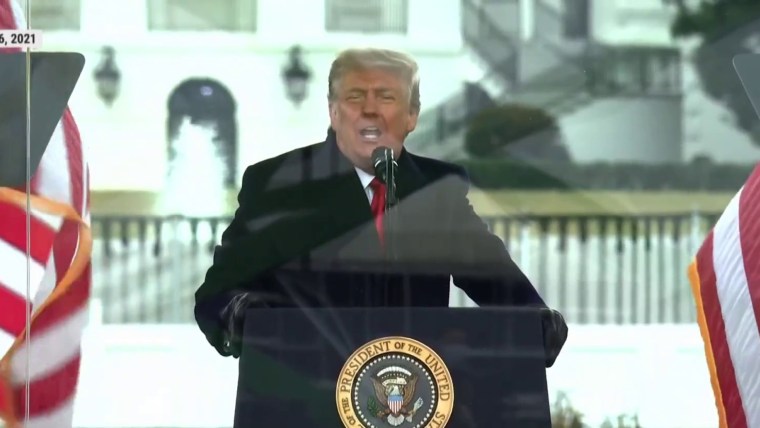On Thursday afternoon the House Jan. 6 committee will hold what is likely to be the final public hearing of its investigation. Between now and January, committee members will be in a race against the clock. That’s when the current Congress ends and Republicans could take over. There’s likely time after Thursday’s presentation for at most one last hearing to present a full summary of the report the members will compile.
The committee on Thursday will, like the producers of hit TV, have the difficult task of sticking the landing.
The committee has presided over a surprisingly well-crafted series of presentations, but it has been 12 weeks since the last one, on July 21. That’s 12 weeks that the spotlight has been off the committee and its findings, even as the man at the center of the investigation — former President Donald Trump — has found himself embroiled in a whole new scandal.
The House Jan. 6 committee is holding its ninth public hearing on Thursday, Oct. 13 at 1 p.m. ET. Get expert analysis in real time on our live blog at msnbc.com/jan6hearings.
At Thursday’s hearing, new details reportedly gathered since the July 21 hearing will clarify Trump’s foreknowledge of what was likely to occur after his Jan. 6, 2021, speech at the Ellipse. But after that string of must-see television broadcasts reshaped the country’s understanding of what happened after Trump convincingly lost the 2020 presidential election to Joe Biden, the committee on Thursday will, like the producers of hit TV, have the difficult task of sticking the landing.
So far, we've seen emerge from the Jan. 6 hearings the kind of coherent narrative arc that Hollywood television producers would envy. Over the summer, viewers were walked through what were essentially eight mini-documentaries, each highlighting a different piece of the overall puzzle. The first and most recent installments were shown in prime time, which not only made it possible for more Americans to watch but also added a layer of prestige.
But then came what amounts to a midseason break. The dramatic revelations from the likes of former White House staffer Cassidy Hutchinson have been filed away in people’s minds, not likely to have been called up in the months since. There have been new storylines to follow out of Mar-a-Lago and chances for the public to craft its own narratives, which might not fully jibe with what the committee has uncovered.

As the pace of the committee’s high-profile work lags behind the public’s imagination, the evidence presented by the committee runs the risk of falling victim to the double-edged sword that popularity creates. It’s what I’ve started thinking of as the “fan service problem.” Fans of popular shows such as ABC’s “Lost,” Syfy’s “Battlestar Galactica” reboot and HBO’s “Game of Thrones” speculated wildly about where their favorite shows were heading and then were sorely disappointed when their finales left viewers with mysteries unsolved, incoherent mythologies left undeciphered and seemingly important plotlines abandoned.
We’ve seen this dynamic play out before under similar conditions in recent years, as high-profile investigations have developed what amount to fandoms of their own.
We’ve seen this dynamic play out before under similar conditions in recent years, as high-profile investigations have developed what amount to fandoms of their own. In the absence of news, special counsel Robert Mueller’s Russia investigation was turned into a jumping-off point for truly epic bits of fan fiction that had some people predicting Trump’s arrest in the Oval Office. His Trump-appointed Mirrorverse counterpart, special counsel John Durham, has been hailed in the MAGA universe as the one to finally expose the “deep state” plot against Trump, even as his probe has fizzled out.
The Jan. 6 committee is engaged in an actual investigation. It isn’t producing a piece of fiction. At no time has there been any sort of surety about where the committee’s findings will lead, which makes the coherent narrative arc I mentioned all the more impressive. But audiences have become accustomed to being appeased and seeing their speculation and theories confirmed on screen. The committee’s challenge now is not to end, like some of the above-named series did, in a way that leaves viewers feeling unsatisfied.
There are still plenty of gaps to fill in and questions for the committee to answer — but after Thursday, there aren’t many bites at the apple left for it to do so in a public setting. Probes by the Justice Department and the district attorney of Fulton County, Georgia, may yield more details about what Trump and his supporters were doing in the days before and after Jan. 6, but there will be no more platforms like this one to present those findings.
Is it unfair that the work of the committee may ultimately underwhelm audiences and diminish the luster of their overall efforts? Absolutely. But the fact that we’re even discussing it as a possibility speaks to the high bar the committee and its staffers have set for themselves.

